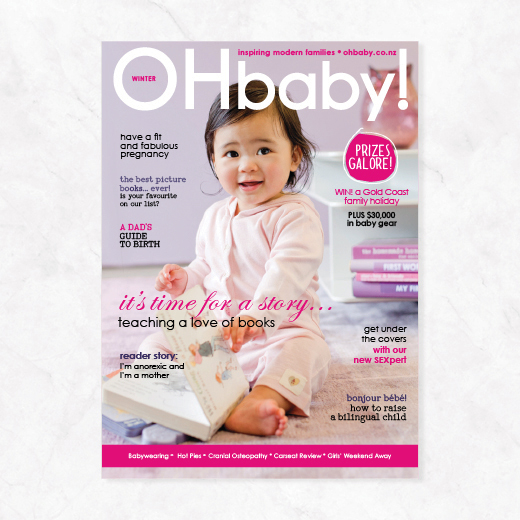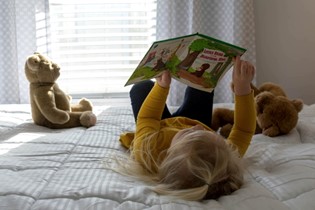Set The Scene For Good Behaviour

Children aren’t always the pliable, amendable creatures we’d like them to be, but as Miriam McCaleb writes, with love and clear limits, life can run more smoothly.
It all started in my local library. It’s open-plan so sound travels. On this particular day, all in the library were privy to the trials of a mother and son. The wee lad was hollering for all he was worth.
“If you keep making that noise, we are going to have to leave the library,” she chastened.
Moments passed, the squawk continued. “Stop it, or we will go,” warned Mum. The noise ramped up as did Mum’s tone: “That is enough! I will take you out of the library!”
And so it continued. After about the 10th exchange, I left the library. I all too easily related to the frustration and intensity of that interaction. Haven’t we all been there before? But if I’d stayed, I think I might have joined in the yelling: “For goodness sake! You said you would go, so go already!”
This had me thinking about rules, relationships and behaviour. I think it would do us all a world of good if we re-thought challenging behaviour and saw it as a learning opportunity. Here are nine lessons I’ve learnt, that I’d like to pass on to that well-intentioned but inevitably frazzled mum in the library.
Lesson one: all behaviour is communication
This is one of those brutal truths that sneaks up on a busy day and whips the parenting rug out from under us. I heard Dr Ron Lally talk about a variation on this theme (“all behaviour has meaning”) back when I used to be a child development expert (ie, before I became a mother and was appropriately humbled). This vital point was reinforced during a conversation with Dr Beverley Flitton, who is a British-trained psychotherapist, family therapist and mother of three grown sons now living in Canterbury. She reminds parents to look beyond the irritating noises or punchy hands and see what lies beneath.
Lesson two: give me attention
Beyond that first lesson is the reality that a child’s misbehaviour is often a bid for attention. As Dr Flitton says, “A child who’s playing up might be saying, ‘You’re not taking enough notice of me."
It’s not just a kid being annoying, it’s a kid telling you how it is for them. If we let it, this will guide parents back to a child’s underpinning need. If we work only on the behaviour, without paying little mind to the root cause of it (the need for attention) we risk simply substituting one challenging behaviour for another. So maybe the noises in the library stop but the child may become a book-chucker instead.
Lesson three: slow down and play
Look, I know. This can be really difficult. I definitely have a “to-do” list that seems to grow ever longer, never shorter. But here’s the irony: it will always go better when I just try to slow down. The day will be less frantic and my children will respond more co-operatively if I at least pretend to be a cool, calm, languid lady.
One of the benefits of slowing down is that this sets the tone for being able to truly listen to our children. Then we can better understand what they are communicating via their behaviour.
If you slow down, you will create time for play. I hear you: “Play? When I’m so darn busy?” It might seem counter-intuitive, but the things on the to-do list will most certainly happen more swiftly and smoothly afterward.
So let’s bring this lesson to the library: if Mum hadn’t gone striding straight to the Adult Non-Fiction and requested son to wait quietly, he mightn’t have found it necessary to protest. Imagine if the child had been allowed to loll about on the beanbags with Mum, muck around with the puzzles for a while, and cuddle on the couch to read a few books.
If a trip to the library started like this, the wee fella would be much more agreeable with, “I’ll just grab a couple of books from the grown-up section on our way out.” Guaranteed.
Lesson four: say what you mean and mean what you say
In the context of our library example, only say you will leave if you mean it. We all make threats and say loopy things when we’re feeling pressured or stressed. It’s especially easy when we’re parenting in public.
It can be a really good idea to buy yourself some time in a situation like this. I heard a great idea about this from Sandy Cassells. She’s a former lecturer in early childhood education now working in family and parent support. She’s a mother of four and a first-time grandmother who has a few trusty strategies up her sleeve, one being to take a breath and have a think before you respond. Try: “Just a minute: I need to tie my shoe.”
Think of it as a deep-breathing, strength-gathering, response-thinking technique. It won’t work if you’re wearing jandals, but you’ll think of something! She would also advise that we carry with us a couple of firm, clear phrases. She’s fond of the simple and powerful, “That’s not okay.” There is value in delivering a firm message in a warm tone.
Lesson five: consistency, follow-through, consequences
In the cases where we promise a consequence to a certain behaviour, we need to follow through. Even if leaving the library meant stepping outside for a few deep breaths on the park bench outside, and then returning, it would help to do so. But the emptiness of an idle threat is extremely unhelpful. What does it teach? That my parent does not do what she says she’ll do?
It can make explanations of future consequences less believable, such as, “If you don’t wear sunscreen your skin will burn.” Wherever possible, we’ve got to turn our declarations into something dependable.
Lesson six: reasonable expectations
Some conflict is avoidable if we simply alter our expectations of our children’s behaviour. At home this might mean environmental changes. My one-year-old loves to dump out potting mix from the big indoor tree. I might not love the aesthetics of a furniture barrier around the tree but it is a simpler and more peaceful solution than months of frustration and bickering as she moves through this developmental stage.
Similarly, we can lessen conflict if we don’t demand that young children wait for long periods. Or if they must wait, we can provide them with something to stay occupied. Crisis averted! In the library, this might have been allowed for by bringing some books from the kids’ section to enjoy while Mama browsed.
As well as developmental stages, there’s a need to consider the uniqueness of each individual child and to avoid making demands that he cannot meet. Another great quote from Ron Lally: “Fairness... is NOT treating each child the same!”
So maybe your firstborn would have waited quietly while you ran errands but your youngest won’t. This is not a deficit, just a difference. Expect the youngest to behave only like himself and plan for that.
Perhaps one of your children objects to plans being altered when another did not, or maybe you have one super persistent child who won’t take no for an answer when your others have been “cruisy as”. Congratulations! You’ve given birth to little humans. These are all typical variances along predictable trajectories of human development.
Check out temperament.com to learn more, and remember that different strategies will (or won’t) work for different kids and that results can vary from one day to the next.
Lesson seven: the secret to successful outings is timing
We are messy biological beings and would do well to consider this where possible. Think: is my child hungry? Am I? If it’s been a while since the last snack and blood sugar is plummeting, compliance is less likely until there is a protein/carb combo on board. A cracker and hummus, cheese and dried fruit, an apple and a handful of nuts... sigh. Life is now worth living again.
Similarly, how well rested is everyone? Would now be a good time to sit quietly for a while? Or has there been too much sitting quietly and it’s time for little bodies to move?
Does anyone need a drink or to use the toilet? All good? Then let’s choose some books.
Lesson eight: discipline means “to teach”
It can be helpful to have conversations with our children before we put them into situations where we expect certain behaviour. Even young children will respond to, “We are going to the library. It is a quiet place. (whisper!) We will use our quiet voices!”
Because, if we don’t tell our children what we expect, how can they know? Discipline means “to teach”, and it is a crucial part of our role as parents. Sandy Cassells puts it like this, “It’s your job as a parent. It’s kind and loving to set limits.”
When my oldest was a toddler, she would go nuts in the post office, which has tempting toys, sticker books and art supplies. I’d be stuck waiting in line while she either writhed in my arms or ran amok. Finally, I had the wherewithal to take a moment with her in the car before entering, and explain what I expected in simple terms. “We are going to the post office. We will probably both see lots of things we like and want! But we are just getting stamps today. I might want to get new pencils! But not today. Today we are just getting stamps.”
Then, when she showed me one tempting item after another, I didn’t have to get cross or frustrated, I could just agree, “Yes, that is lovely! But we are just getting stamps today.”
What a difference this made to the post office mission.
Lesson nine: aspiring to awesomeness can backfire
In contrast to the previous eight points, this one overrides them all. It reminds us that the aspiration to be an amazing and admired mother can backfire. As Dr Flitton says, “Sometimes we try so hard to do the right thing, we stress ourselves out. Kids pick up on that tension and misbehave.”
So, breathe in, breathe out. Repeat. Smile. Shrug your shoulders. Release the tension in your body. Relax. Laugh! Most of the things we stress about with parenting don’t really matter (with the exception of water, roads, firearms etc). But other than that, chill! If you’re the sort of mama taking time to read a parenting magazine, I’m willing to bet you’re doing a fine job.
So to that lady in the library, I want to say… take heart. Parenting is hard work, and we all have days where we feel like beginners. All behaviour can improve: it’s not too late.
Embrace the wisdom in this lovely Chinese proverb: “The best time to plant a tree is 100 years ago. The second-best time is today.”
If some of your family’s habits don’t serve you any more or if your strategies have been less than magnificent to date, fret not. Now is the perfect time to make positive changes in the name of improved behaviour, richer relationships and family harmony.
Miriam McCaleb is a former university lecturer who relishes her new life of motherhood and writing. She does her darndest to play with her children every day and to set clear limits. Occasionally she even succeeds. Visit her at babygeek.co.nz.

AS FEATURED IN ISSUE 22 OF OHbaby! MAGAZINE. CHECK OUT OTHER ARTICLES IN THIS ISSUE BELOW

















